Battlestar Galactica — Elegance and depth in one of the best board games of all time
We take a look at, perhaps one of the best known deception based board games of all time — Battlestar Galactica: The Board Game
In the lonely darkness of space, silent muzzle flares signal Starbuck taking down another Cylon fighter in the seemingly endless swarm buzzing around the Galactica. Ironically it is not one of the automatons that later takes her down but a stray PDC round from the giant ark itself, clipping through her engine as it desperately targets the waves of attackers. In the bridge of the ship, Adama is about to issue the order to nuke the basestar that is the source of all the fighters when a party of MPs arrive to escort him to the brig. Mutiny is afoot on the Galactica and, worse than that, unbeknownst to any of the crew a dissident resistance faction has placed a bomb aboard the Presidential carrier. Behind all this lurks an unknown Cylon sleeper agent, working in the shadows to undermine humanity’s last chance of survival. How many of these calamities are down to their machinations and how many are just the result of exhaustion and overstretched resources? This is Battlestar Galactica: The Board Game.
Fantasy Flight Games’ Battlestar Galactica (sadly now out-of-print as the licence has expired) is my favourite board game of all time. The reason for that can be summed up in three words; elegance, tension and narrative. BSG is a design masterclass in all three. I have played the game, with and without expansions (there are three), dozens of times and there is no sign of slowing down or losing enthusiasm. The game remains an evergreen, popular suggestion with my gaming group — everyone is always keen to see what new stories will unfold the next time the box is opened.
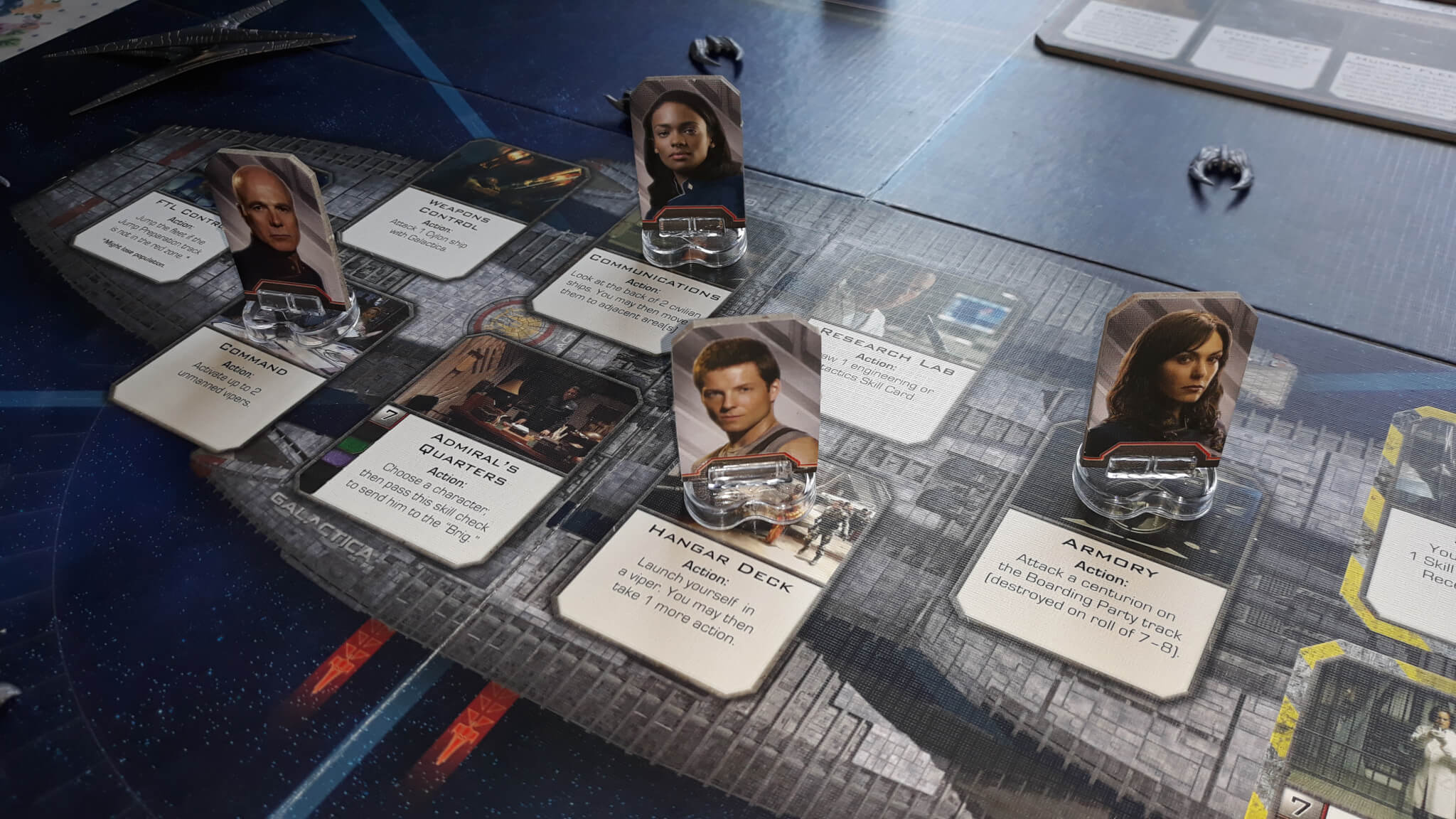
This endless replayability is a direct result of the wonderful way Battlestar Galactica builds organic narratives without ever compromising its mechanics or making players feel railroaded. The interaction between all of the player choices and the random elements of the game combine to create a huge number of possible ways a game of BSG can play out, all the while allowing you to envisage the narrative play out in your mind’s eye. Of all the board games based on TV, book or film licences that I have played, BSG is the one that feels closest to actually recreating the source material.
In Battlestar Galactica, each player takes on the role of a crew-member of the famous ship from a large number of possibilities (Adama, Tigh, Roslin, Apollo, Starbuck, Helo, Baltar, Zarek, Boomer and Tyrol are playable in the core game with loads more in the expansions from the crew of the Pegasus, additional Galactica crew and civilians, alternate versions of the original characters and even the Cylons themselves). A turn plays out with each player able to move around the various locations on Galactica and Colonial One (the aforementioned Presidential carrier) and take one Action. Actions can come from a variety of places. Each player has a hand of Skill cards, many of which can be cashed in for access to a powerful Action such as repairing damaged locations on the ship, drawing additional Skill cards or making attacks on circling enemy ships. In addition, some individual characters have access to special Actions, although they can usually only be used once per game. The most common source of Actions, however, are the locations on the board that offer a wide variety of options from politically influencing the remnants of the human race through targeting Galactica’s guns or fighters on enemy ships to checking on the civilian fleet whose survival is key to victory.
Once a player has moved and taken their Action it’s time to draw a card from the Crisis deck. There are two types of cards in the Crisis deck. The first, and least frequent, are Cylon fleet cards, that represent the constant hounding of Galactica by hostile Cylon ships. On the board the Galactica is surrounded by space that is divided into sectors. Once a Cylon fleet card is drawn these sectors are filled with Cylon ships as indicated on the card; fighters, troop carriers and the immense (and immensely threatening) Cylon basestars. In addition, each of these Cylon fleet cards will also tell you to place civilian fleet tokens on the board. These tokens represent the defenceless and vulnerable elements of the human fleet. These can be destroyed by the Cylon ships with a resultant loss of resources that can be catastrophic.
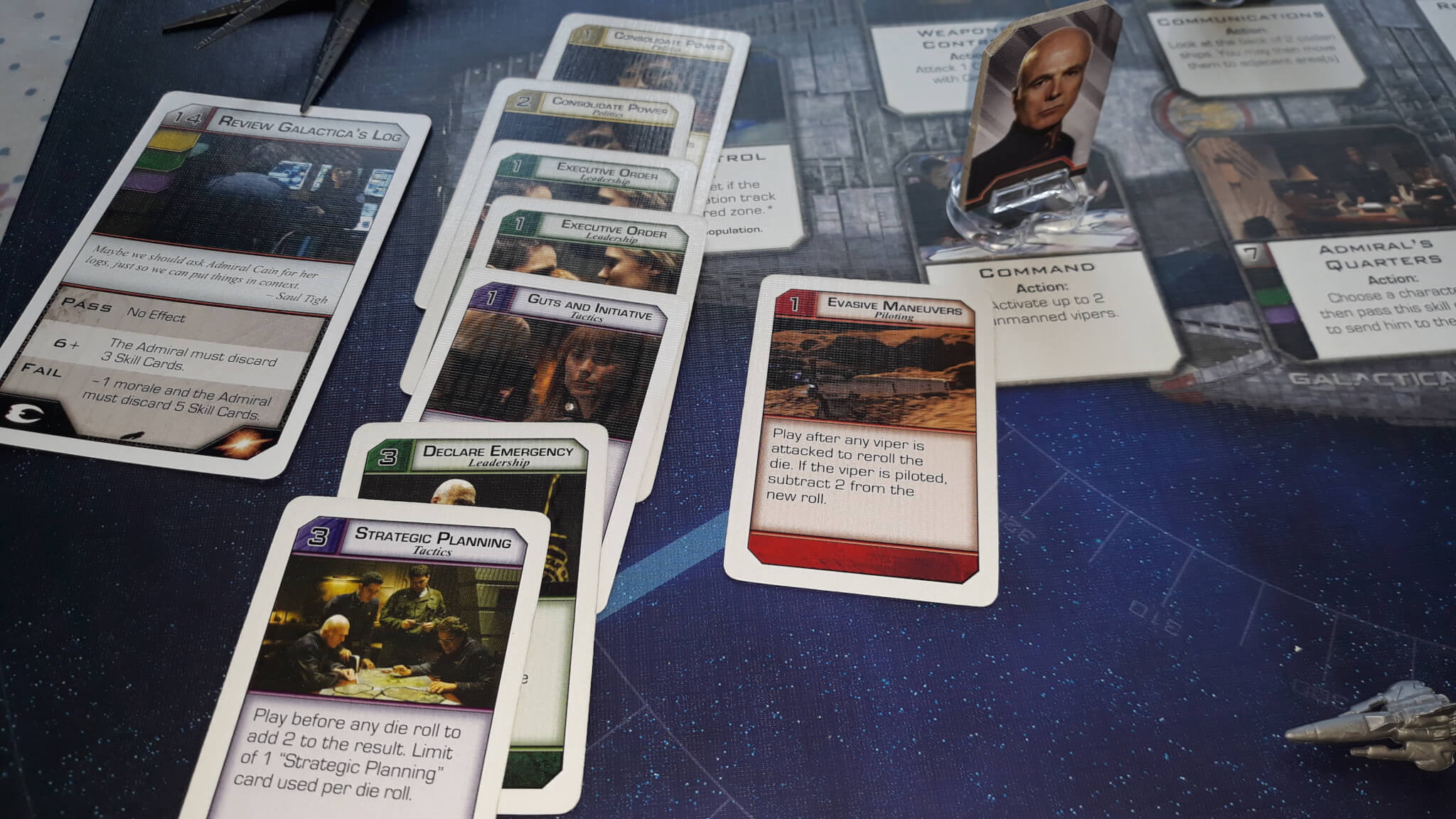
If the Cylon fleet cards sound bad for humanity’s chances of survival (and they are) it should tell you something that they can sometimes feel like a blessed relief compared to the Crisis cards that make up the rest of the Crisis deck. Rather than placing hostile ships on the board, each of these Crisis cards describe a situation and present the players with either a choice or a skill check. This can be anything from riots to a water shortage to equipment malfunction to an attempted mutiny. Resolving these can be as simple as the current player, President or Admiral (roles within the game) making a choice between two bad outcomes or offering a skill check for the players as a group to attempt.
These checks use up skill cards from one of the different pools that players draw at the start of each turn. When a skill check is required by a Crisis the card will indicate which of the five skills are positive to the outcome. Players then, proceeding in turn order, place cards into a pool in the middle, as well as two cards at random from a destiny deck that contains some of all the skill cards. The player whose turn it is will then total up the numbers on all the cards marked as being positive for the skill check and subtract the total of all the cards that are of a type not mentioned. The card will say what to do if the skill check is passed (usually nothing, which may sound anticlimactic but is a massive plus for the humans in the game) and what to do if the skill check is failed (always, always, always very, very bad). The key thing about these skill checks is that, when the skill cards are placed into the pool, they are face-down. Nobody around the table will know who put what skill cards into the pool. Complicating this is the destiny deck that adds two cards at random. If a negative card is present that has sunk the skill check it could have come from a player or from the destiny. Logical deduction can help you to have a feeling on who the culprit may be (if there even is one) but it is very difficult to be sure.
The final thing that a Crisis card may have on it is a Jump Signal, which brings us neatly onto how players win or lose Battlestar Galactica. Humanity is attempting to escape from the Cylon fleet. To do this they need to complete a number of FTL (Faster-Than-Light) jumps that are represented by a track on the board. Every time a Crisis card with a Jump Signal on it is drawn the jump marker moves up a place on the track. If it crosses the FTL jump threshold, the marker returns to the beginning, all Cylon ships, civilian ships and fighters are removed from the space around Galactica and the Admiral draws two Destination cards, choosing one to keep. These Destination cards will have a number on them, indicating how far Galactica jumps. Once the total distance on played destination cards is at least eight, one more FTL jump will result in a win for humanity.
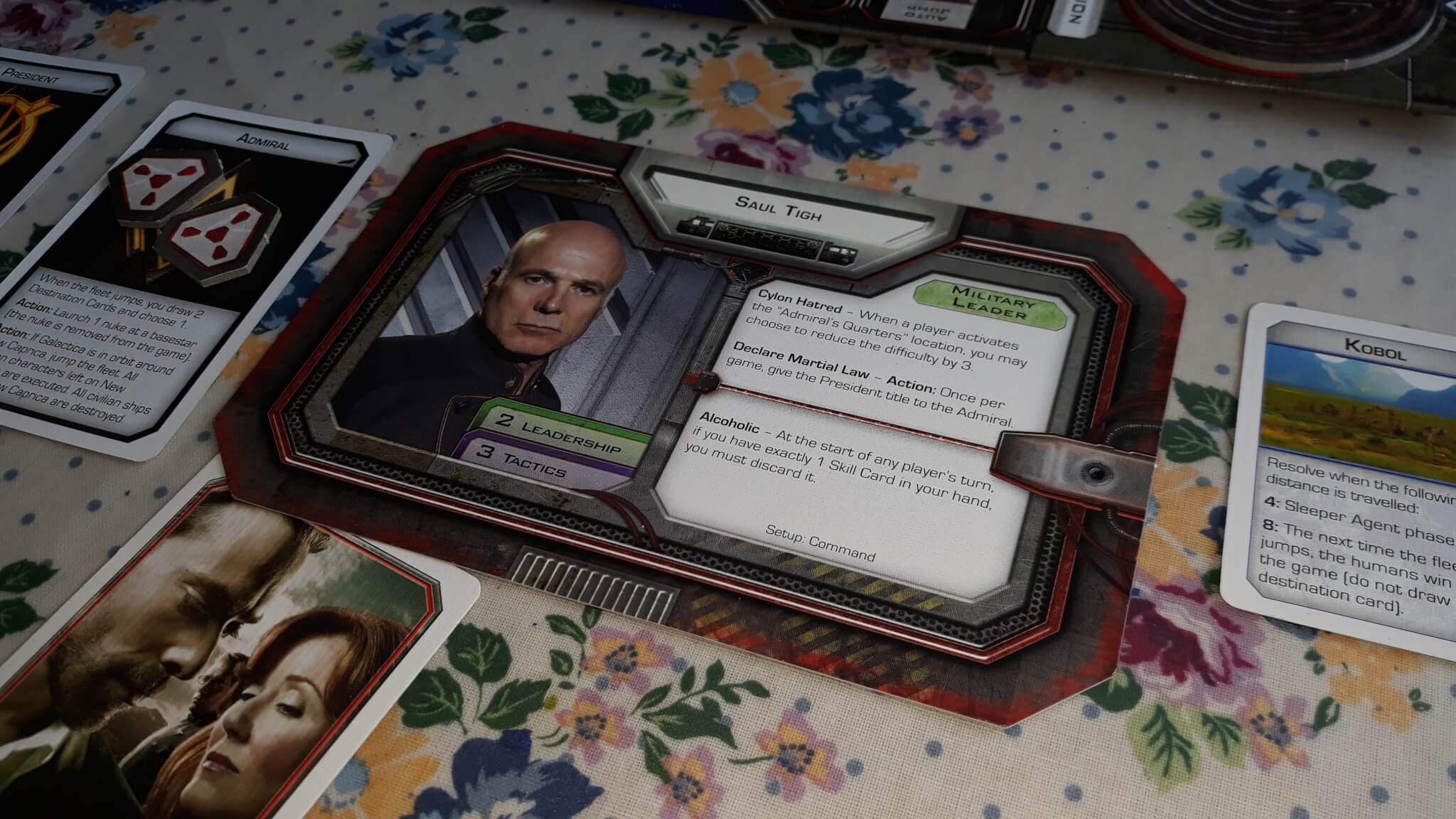
There is only one way for humanity to win but there are several ways to lose. First, and most common, is for one of the four resource dials on the game (Food, Fuel, Morale and Population) to reach zero. Managing these resources is key to humanity’s survival and it is all too easy to lose them whether from Crisis cards, destroyed civilian ships or even a side-effect of otherwise positive Actions (enacting martial law, for example, can provide a powerful boost but at the cost of Morale and a common cost of Destination cards is a certain amount of Fuel). The second way is for a boarding party placed onto Galactica by Cylon ships to reach the bridge and seize control. The final way that humanity can lose is for Galactica itself to be destroyed. Over the course of the game locations on humanity’s flagship can be damaged by Cylon ship attack, by Crisis cards or by other effects. As well as injuring players in that space and preventing the location’s Action from being used, if at any point five or more locations of Galactica are damaged then the ship is destroyed and humanity loses.
In a nutshell, that is a turn of Battlestar Galactica. It may sound like a lot but it is, in its core, very elegant and that is one of the cornerstones of its success as a game. You move, take an Action and resolve a Crisis card (a choice, a skill check or a new Cylon fleet). It is then the next player’s turn. The complexity of the game comes in choosing the right thing to do on your turn and managing your resources, both in terms of the fleet’s resources and your own skill cards. These skill cards represent your best chance to affect the game in a meaningful way but you will always have to choose what to surrender in order to use them. Do you cash in your value five Tactical card to add two to a key dice roll, or save it to deal with a potentially devastating Crisis card that’s coming up? Such choices are the meat and drink of BSG.
Perhaps you’ve got this far through this review and thought this all sounded like a nifty little co-operative board game where everybody works as a team to save humanity? If you’ve seen the re-booted Battlestar Galactica series that this game is based on that will not seem representative and, in fact, it is not. In the TV show there are Cylon sleeper agents embedded in the fleet, passing for human, sowing disruption and chaos amongst the humans. Plus there is Gaius Baltar, who is just a loon. In the game this is represented by the potential for any player to be a Cylon sleeper agent, actually working against all the human players. If humanity wins, all the Cylon players lose (there can be more than one, depending on player count). As a mechanic this is represented by each player receiving a loyalty card at the start of the game (and another halfway through) that will mark them as human or Cylon. This dynamic really creates interesting situations with regard to trust and suspicion around the gaming table (and these are the best situations in board gaming for me).
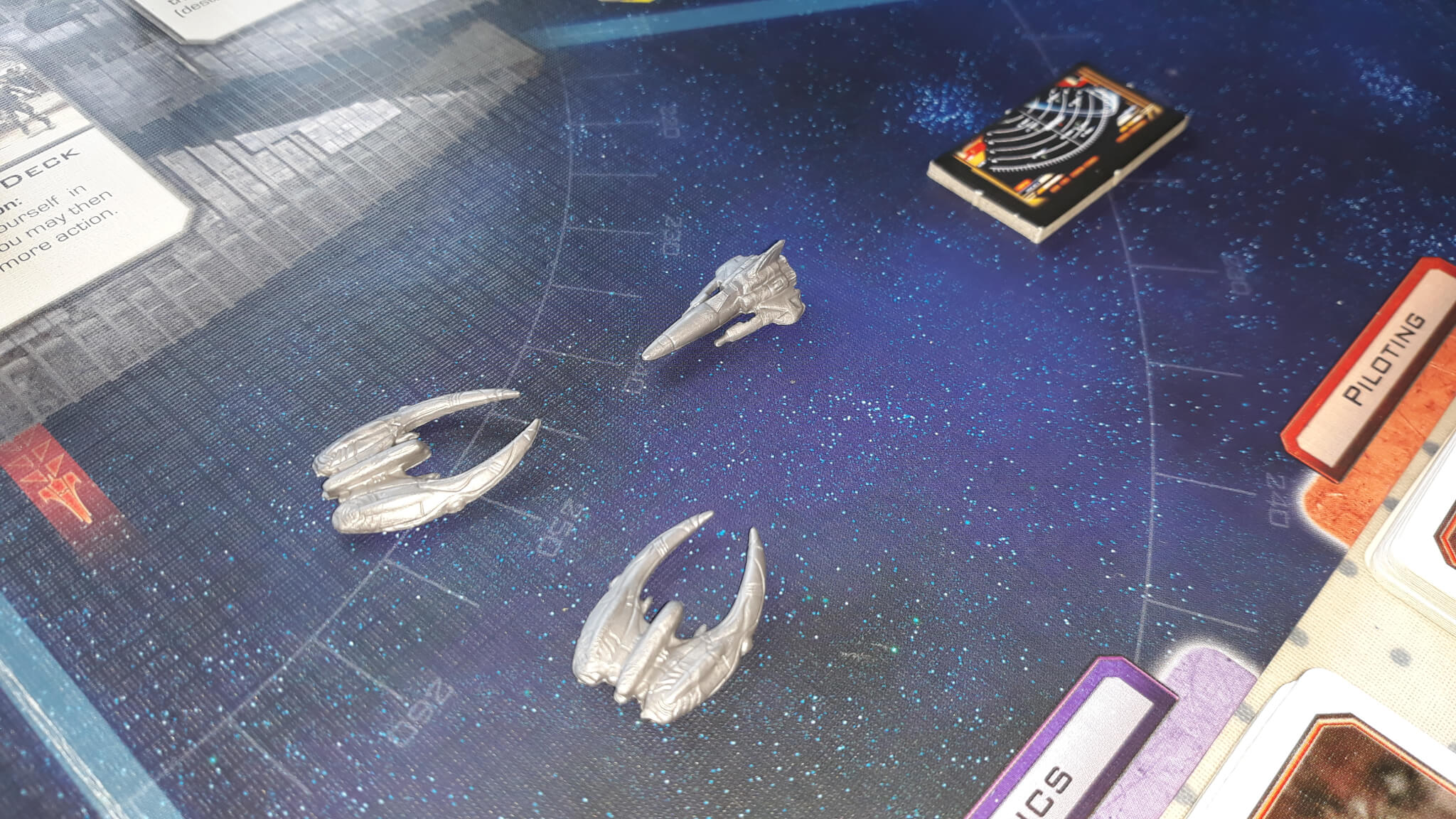
As a Cylon sleeper agent you have the potential to sow disruption in a number of insidious ways from sinking skill checks by adding negative skill cards to them, manipulating the Crisis or Destination decks to offer worse outcomes or, of course, just throwing suspicion liberally around the table. Added to this is the fact that if an Admiral or the President is a Cylon, with access to their unique abilities, it is a real pickle for all the humans around the table. One of the key things that I love about BSG, however, is that you don’t have to hit these mechanical crutches hard to be an effective Cylon sleeper. Intentionally inefficient play and holding back resources can be devastating. BSG naturally comes to crisis points during play that the game can hinge on and, as a Cylon, identifying these moments and choosing when to strike are essential to victory, and immensely rewarding. You need not live in fear of outing yourself either; a Cylon player can, as an Action on their turn, declare themselves to the table. When they do this they move to a special part of the board and gain unique, powerful abilities to harry and cause problems for the humans. Playing against one revealed Cylon player and one hidden Cylon agent can be a real challenge for the humans, rewarding for the Cylons and a lot of fun for everyone.
It is very rare, in my experience, for a game to create mechanically rewarding gameplay with such a diverse ability to grow organic narratives while at the table. Playing a good game of BSG will result in a story that you’ll tell your friends about for years and has the potential to be a gaming highlight of your entire collection. Having said that, BSG is not for everyone — As with any hidden role game, accusations will fly and the suspense and tension at the table can mount. If any of these things sound like triggers for you or you have found yourself unable to enjoy games such as Resistance or Secret Hitler for these reasons then it may be best avoided.
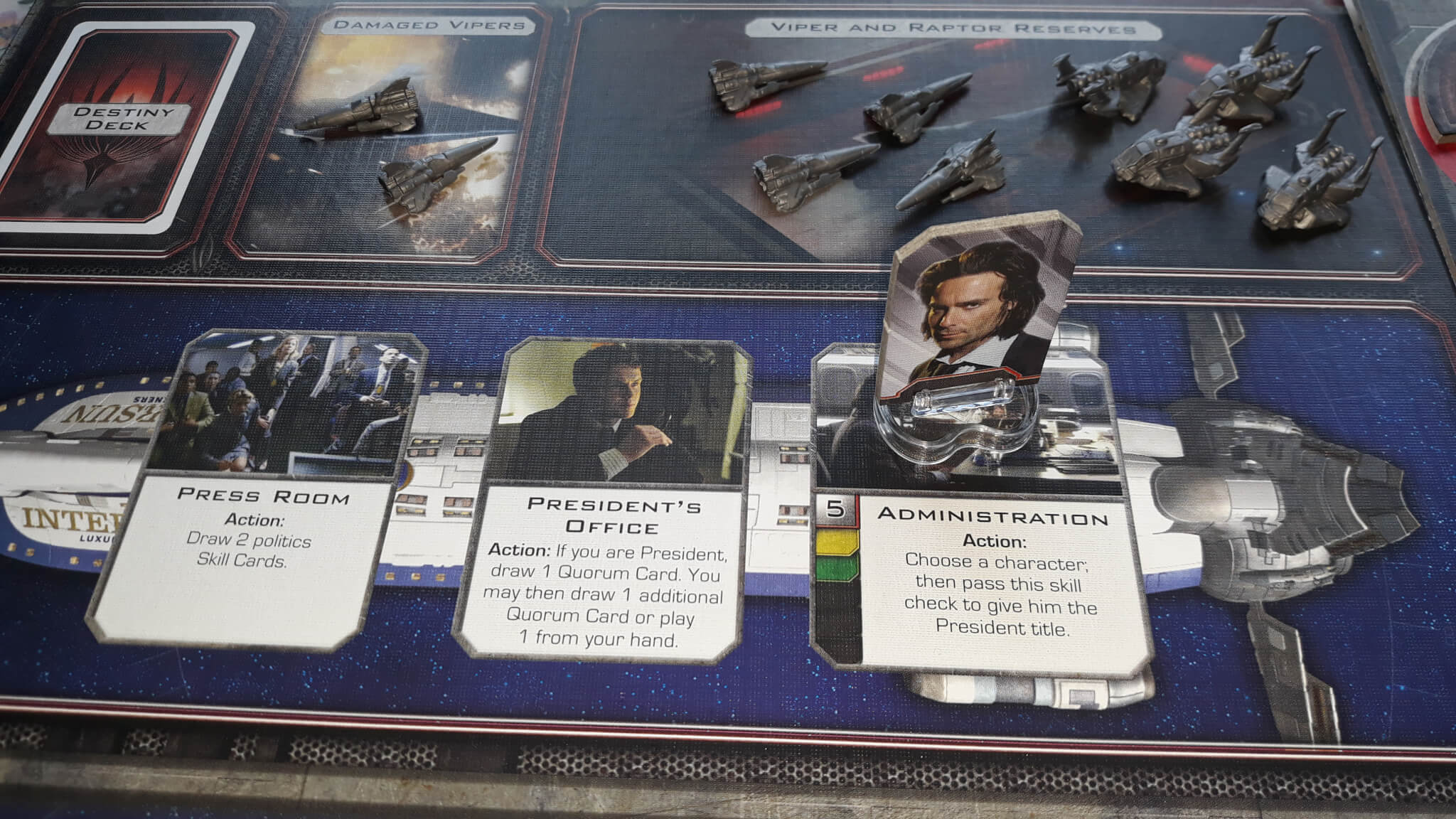
Then, of course, there is the simple fact that if you want to get a copy of BSG it is likely to set you back anywhere from £80 to £150 for the base game and a frankly shocking amount of money for all three expansions (all of which add elements that vastly improve the game). If you’re looking for in-print alternatives you will find some similar gameplay experiences in Dead of Winter (Plaid Hat Games), The Thing (Mondo Games) or Dark Moon (a stripped down, de-themed version of BSG published by Stronghold Games). Neither of these is as good at creating organic narratives as BSG however so my top recommendation for recreating this kind of experience would be Nemesis (Awaken Realms). Effectively Alien: The Board Game (albeit unlicensed) Nemesis is coming soon to retail. It has many similar elements to BSG and is the only thing I have played that comes close to its emergent narrative triumphs.
You can find out more information on Battlestar Galactica: The Board Game on their publisher’s website.

Shit